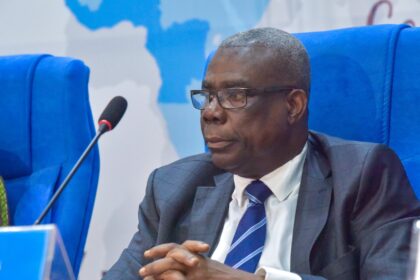By: Hamza Lansah Lolly/Baba Mohammed Issahak
The Former Finance Minister and Ranking Member of the Finance Committee in Parliament, Hon. Dr Mohammed Amin Adam has defended the economic legacy of the previous administration, asserting that Ghana’s recent financial turnaround is rooted in policies implemented under President Nana Akufo-Addo and Vice President Dr Mahamudu Bawumia.
According to Dr. Amin Adam, the recent cedi appreciation has been made possible by a reserve stockpile of $8,98 billion, accumulated by end-2024 under the NPP government. “It was this reserve position-combined with policy credibility that led the IMF to lift FX intervention restriction of $60 million per month in late 2024. This allow the Bank of Ghana to inject $590 million into the market in April 2025”
Dr. Amin Adam in a rejoinder issued on Thursday 23, May 2025 dubbed “setting the records straight” in response to claims made by the Ranking Member of the Finance Committee, Hon. Isaac Adongo at a press confab attributing the recent economic gains to the early efforts of the Mahama-led government, which took office just four months ago.
He noted that, attempts by the NDC repackage Ghana’s macroeconomic stability as the direct results of a four-month-old administration is disingenuous. “While political branding may serve short-term narratives, it must not come as the expense of facts, especially when the stakes involve public confidence , investor trust and credibility of Ghana economic reform process”. He added
“As usual the Hon Adongo tried to bring former President Akufo Addo and former Vice President Fr. Mahamadu Bawumia in line for attacks. However, these gentlemen will not honor Hon MP with responses, as i believe that my response will adequately address the matters he raised”. The statement noted
Dr. Amin Adam hinted that, the current macroeconomic stability reflected in a cedi appreciation, gradual disinflation and improving investor sentiment is not the product of a sudden reset by the Mahama administration, `It is the result of difficult, structured policy choices made in 2022 and 2024, including painful fiscal consolidation, revenue reforms, and international negotiations’ that restored macroeconomic credibility”.
The Karaga MP cited IMF assessments from late 2024 and early 2025 that praised Ghana’s recovery trajectory, crediting reforms initiated before the change in leadership.
Among the achievements cited were a significant reduction in Ghana’s debt-to-GDP ratio from over 80% in 2020 to 53.7% by January 2025, and a strengthening of international reserves that empowered the Bank of Ghana’s recent interventions in the forex market.
While acknowledging the recent appreciation of the Ghanaian Cedi, up by 16.8% since January 2025, according to Bank of Ghana data, Dr Amin Adam urged caution. He noted that inflation and high borrowing costs continue to burden ordinary citizens.
“The gains made are fragile and must be consolidated through transparent governance and prudent policymaking,” he concluded, calling on the current administration to focus on long-term growth rather than engaging in partisan credit claims.
The debate comes at a time of growing optimism about Ghana’s economic prospects, even as key indicators remain under close watch by financial institutions and the general public.


